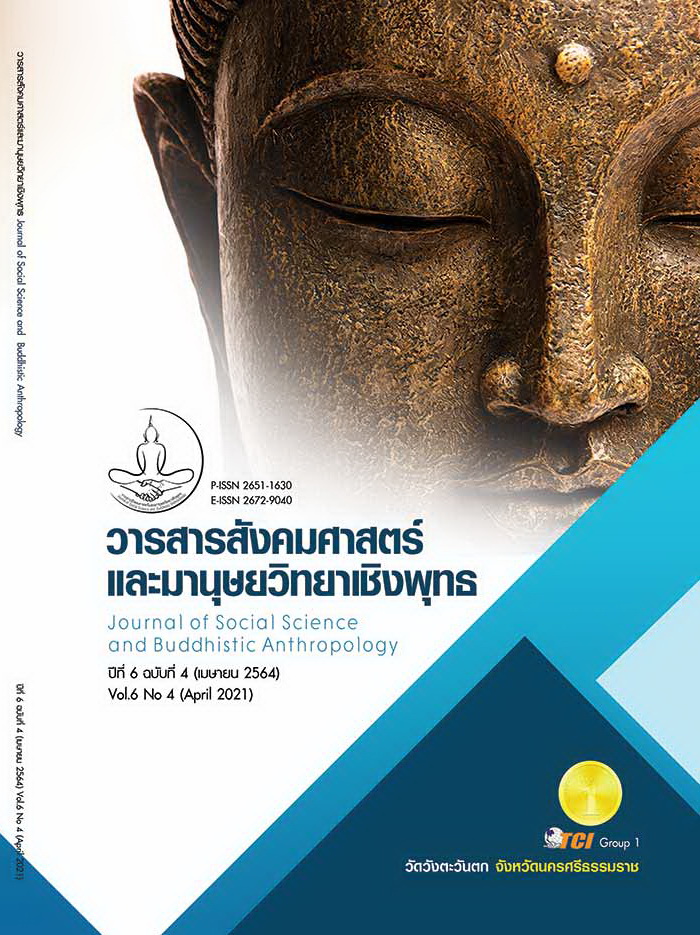THE MYTHS AND FOLKTALES ARE USED TO CULTURAL IDENTITY NEGOTIATION UNDER THE CURRENT SOCIAL CONTEXT IN ISAN
Keywords:
Myths and Folktales, Cultural Identity, Social in IsanAbstract
The objectives of this article were to: study the use of myths and folktales of the Tai Diasporas in Isan for cultural negotiation under the context of Isan society. It was used by the ten groups of Tai Diasporas who have lived in Isan region since the past and used Tai language i.e., Ka loeng, Nyo, Tai boeng, Tai Loei, Tai Dam, Phu tai, Phuen, Yoy, Laos and Sak. The methodology is mainly for collecting data from documented records and field data additionally. The results of this study revealed that myths and folktales of the Tai diasporas in Isan were used to negotiate cultural identity under the context of Isan society. It was also found that 1) The myth and folktales of the Tai Diasporas in Isan are used to construct social space, 2) The myth and folktales of the Tai Diasporas in Isan are used to power negotiation, 3) The myth and folktales of the Tai Diasporas in Isan are used to cultural reproduction. By the use of myths and folktales of the Tai Diasporas in Isan for cultural reproduction are remarkable, make others ethnic groups be well-know and be more socially acceptable. Including, cultural reproduction has become an economic stimulus for people in the community. Particularly, the use of myths and folktales is the cost of production and tourism. The myths and folktales of the ethnic Tai Diasporas in Isan are narratives that are consistent with the nature, way of life, beliefs and history of each ethnic group. They are another important way of expressing ethnic identity and also an important tool in cultural negotiation which is reproduced and modified the way in accordance with current Isan social context.
References
จารุวรรณ ธรรมวัตร. (2529). พงศาวดารแห่งประเทศลาว คือ หลวงพระบาง, เวียงจันทร์ เมืองพวนและจำปาสัก. มหาสารคาม: สถาบันวิจัยศิลปะและวัฒนธรรมอีสาน มหาวิทยาลัยศรีนครินทรวิโรฒ มหาสารคาม.
ชุติมา ประกาศวุฒิสาร. (2551). พื้นที่ในความทรงจำกับการสร้างอัตลักษณ์พลัดถิ่นในวรรณกรรมสตรีร่วมสมัย. วารสารอักษรศาสตร์, 44(1), 171–172.
ฐิรวุฒิ เสนาคำ. (2547). แนวคิดคนพลัดถิ่น ว่าด้วยแนวทางการศึกษาชาติพันธุ์. กรุงเทพมหานคร: ศูนย์มานุษยวิทยาสิรินธร.
เติม วิภาคพจนกิจ. (2557). ประวัติศาสตร์อีสาน. (พิมพ์ครั้งที่ 5). กรุงเทพมหานคร: มหาวิทยาลัยธรรมศาสตร์.
ถวิล ทองสว่างรัตน์. (2527). ประวัติผู้ไทยและชาวผู้ไทยเมืองเรณูนคร. กรุงเทพมหานคร: เรืออนันต์.
ธวัช ปุณโณทก. (2545). ศิลาจารึกอีสาน. กรุงเทพมหานคร: มหาวิทยาลัยรามคำแหง.
บุญยงค์ เกศเทศ. (2548). อรุณรุ่งฟ้าฉานเล่าขานตำนานคนไท. กรุงเทพมหานคร: หลักพิมพ์.
ปรมินท์ จารุวร. (2559). คติชนกับการท่องเที่ยว. กรุงเทพมหานคร: ศูนย์หนังสือแห่งจุฬาลงกรณ์มหาวิทยาลัย.
ไพฑูรย์ มีกุศล. (2542). แสก: ชาติพันธุ์. ใน สารานุกรมวัฒนธรรมไทย ภาคอีสาน. มูลนิธิสารานุกรมวัฒนธรรมไทย ธนาคารไทยพาณิชย์.
ยศ สันตสมบัติ. (2556). มนุษย์กับวัฒนธรรม. (พิมพ์ครั้งที่ 4). กรุงเทพมหานคร: มหาวิทยาลัยธรรมศาสตร์.
ศรีศักร วัลลิโภดม. (2542). ภูเขาศักดิ์สิทธิ์กับความเป็นสากล. เมืองโบราณ, 24(3), 9–22.
ศิราพร ณ ถลาง. (2559). เรื่องเล่าพื้นบ้านไทยในโลกที่เปลี่ยนแปลง. กรุงเทพมหานคร: ศูนย์มานุษยวิทยาสิรินธร.
สมเด็จกรมพระยาดำรงราชานุภาพ. (2556). นิทานโบราณคดี. กรุงเทพมหานคร: ไทยควอลิตี้บุ๊ค (2006).
สุกัญญา สุจฉายา. (2555). เศรษฐกิจสร้างสรรค์กับการจัดการวัฒนธรรม. วารสารไทยศึกษา, 7(2), 217–240.
สุวิไล เปรมศรีรัตน์ และคณะ. (2547). แผนที่ทางภาษาของกลุ่มชาติพันธุ์ต่าง ๆ ในประเทศไทย. กรุงเทพมหานคร: สำนักงานคณะกรรมการวัฒนธรรมแห่งชาติ.
อภิญญา เฟื่องฟูสกุล. (2546). อัตลักษณ์. กรุงเทพมหานคร: คณะกรรมการสภาวิจัยแห่งชาติ สาขาสังคมวิทยา สภาวิจัยแห่งชาติ.
อภิลักษณ์ เกษมผลกูล. (2558). เรื่องเล่าพื้นบ้านกับการสร้างมูลค่าเพิ่มให้ผลิตภัณฑ์ท้องถิ่น (OTOP) ในบริบทเศรษฐกิจสร้างสรรค์ . กรุงเทพมหานคร: ศูนย์มานุษยวิทยาสิรินธร.
อรุณทิพย์ ป. ณ นครพนม. (2558). ตำนานและนิทานของไทแสก. นครพนม: ศูนย์มานุษยวิทยาสิรินธร.









